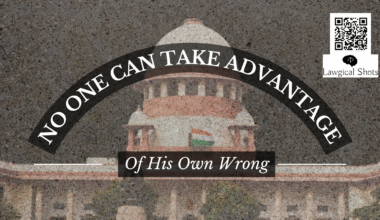To begin with, pecuniary jurisdiction refers to monetary limits within which a particular court or tribunal can hear or decide the cases. In consumer complaints, there is a consideration paid for the goods or services. Another set of numbers reflects the compensation claimed by the complainant. In cases where the loss is higher, the Consumer Protection Act, 2019 still requires the Consumer Forums to follow the amount paid in consideration. The correctness of this rule was discussed by the Supreme Court in a judgment on pecuniary jurisdiction of Consumer Forums.
Crux of Pecuniary Jurisdiction in Consumer Courts
The Supreme Court of India in Rutu Mihir Panchal v. Union of India (2025) held that while determining the pecuniary jurisdiction of the District, State and National Consumer Commissions (Consumer Commissions) based on the consideration paid for the goods or services is valid. The Court upheld the constitutional validity of Sections 34(1), 47(1) (a) (i) and 58(1) (a)(i) of the Consumer Protection Act, 2019. It clarified that pecuniary jurisdiction does not violate Article 14 of the Constitution of India. This ruling provides much needed clarity and helps streamline Consumer Dispute Resolution in India.
Brief Facts
The Judgment deals with questions of law arising out of a Writ Petition filed under Article 32 of Constitution of India and a Civil Appeal. The two matters have been merged for addressing the common question in issue. Both the writ petition and civil appeal challenge the provisions under Sections 34(1), 47(1)(a)(i) and 58(1)(a)(i) of the Consumer Protection Act, 2019. The challenge pertains to the pecuniary jurisdictions of district, state and national commissions on the basis of value of goods and services paid as consideration, instead of compensation claimed. It has been stated that if it was Consumer Protection Act of 1986, they could proceed with their claims as per the compensation claimed.
Comparative Chart of Pecuniary Jurisdiction under Consumer Protection Act 1986 and 2019
Below is the comparison drawn of the Jurisdiction exercised by the different forums under the repealed 1986 Act and 2019 Act:
| Forum | 1986 Act | 2019 Act |
| District Commission | Section 11(1):- Where the value of Goods or Services and the Compensation, if any claimed does not exceed Rs. Twenty Lakhs. | Section 34(1):- Where the value of Goods or Services paid as consideration does not exceed One Crores Rs. |
| State Commission | Section 17:- Where the value of Goods or Services and the Compensation, if any claimed exceeds Rs. Twenty Lakhs but does not exceed Rs. One Crores. | Section 47:- Where the value of Goods or Services paid as consideration, exceeds Rs One Crore, but does not exceed Rs Ten Crore. |
| National Commission | Section 21:- Where the value of Goods or Services and the Compensation, if any claimed exceeds Rs. One Crores. | Section 58:- Where the value of Goods or Services paid as consideration exceeds Rs. Ten Crores. |
Legal Issues Involved
- Whether jurisdiction based on consideration paid (rather than compensation claimed) is constitutionally valid.
- Whether such a classification is arbitrary, violating Article 14 of the Constitution.
- Whether the 2021 Rules effectively deny access to appropriate consumer forums in high-value disputes.
Arguments on Pecuniary Jurisdiction of Consumer Forums in 2019 Act
- Petitioner’s contentions – The petitioner alleged that the impugned provisions give rise to an anomalous situation wherein, for instance, a person claiming compensation of Rs. 50 Crore, for a defect or deficiency in goods purchased or services availed, for consideration lesser than Rs. 1 Crore will have to go before the district commission. At the same time, one can approach the National Commission, even if the compensation is less than Rs. 1 Crore. According to petitioner, the pecuniary Jurisdiction is discriminatory as consumers, who had claimed identical compensation, but paid different considerations at the time of purchase of goods or services, are treated differently.
To buttress their argument, they referred to Section 2(7) of the 2019 Act which defines “consumer” and includes within its ambit any person who buys goods/services for a consideration which is (i) fully paid or promised, (ii) partly paid or promised, (iii) under a system of deferred payment, and also includes (iv) a user of such goods or services. Thus, when the definition of “consumer” itself does not discriminate on the basis of the consideration paid and includes every consumer in the wide spectrum, restricting access to judicial remedies on the basis of consideration paid is illegal and arbitrary.
It was argued that the classification lacks intelligible differentia and rational nexus, hence violates Article 14.
- Respondent’s contentions – The Union inter alia alleged that the impugned provisions are based on a reasonable classification. It was submitted that classification created on the basis of value of goods and services paid as consideration not only creates an intelligible differentia, but also has a rational nexus with the object sought to be achieved, which is “timely and effective administration and settlement of consumer disputes” and the provisions are not arbitrary and were introduced to prevent exaggerated claims.
Supreme Court’s Judgment on Pecuniary Jurisdiction in Consumer Courts
- The Supreme Court held that the Parliament has legislative competence to prescribe jurisdiction and powers of a court, coupled with the power to constitute and organize courts for administration of justice. It also takes within its sweep the power to prescribe pecuniary limits of jurisdiction of the courts or tribunals, under Entry 95 of List I read with Entries 11-A and 46 of List III of the Constitution.
- The Court observed that classification of claims based on the value of consideration paid for goods or services is neither illegal nor discriminatory, as consideration is an integral part of forming any contract and is essential to the definition of a “consumer” under Section 2(7) of the 2019 Act.
- The Court observed that the classification of pecuniary jurisdiction based on value of goods and services paid as consideration has a direct nexus to the object of creating a hierarchical structure of judicial remedies through tribunals.
- While upholding the constitutional validity of the provisions, the Court directed the Central Consumer Protection Council and the Central Consumer Protection Authority to exercise their statutory duties to survey, review, and advise the government on measures necessary for effective functioning of the statute.
- To determine whether a provision of law is violative of Article 14 or not depends upon two conditions, namely (1) that the classification must be founded on an intelligible differentia which distinguishes those that are grouped together from others, and (2) that that differentia must have a rational relation to the object sought to be achieved by the Act.”
- Further, the Court emphasized that these statutory bodies must work effectively and efficiently to protect consumers against unfair practices and prevent any offence against consumer rights, with their functioning being subject to judicial review. Vibrant functioning of the Council and the Authority will subserve the purpose and object of the Parliament enacting the 2019 Legislation.
Conclusion
The Rutu Mihir Panchal judgement is a landmark in consumer jurisprudence, aligning statutory interpretation with constitutional benchmarks. It supports Parliament’s objective of creating a streamlined, predictable and efficient system for consumer disputes. While it prioritizes administrative order and legal consistency, it also underscores the need for responsive mechanisms for exceptional cases, where the severity of harm is high despite low consideration.
This case reflects the court’s evolving approach to balancing individual access to justice with systemic efficiency in India’s consumer redressal mechanism.








